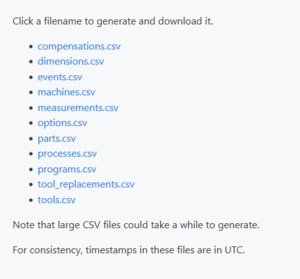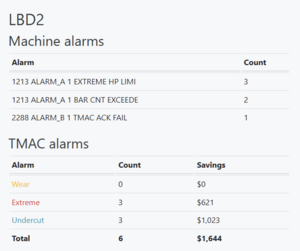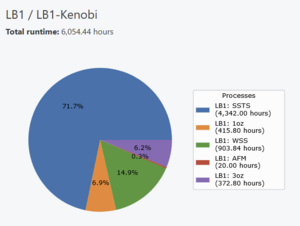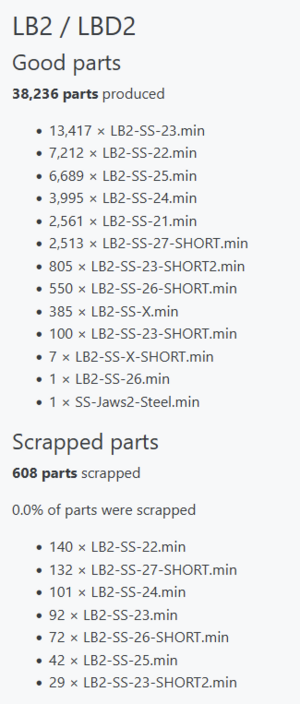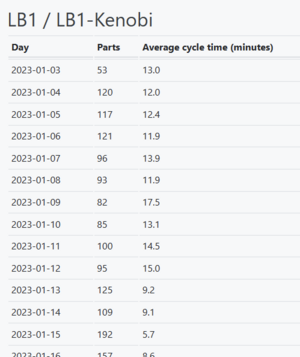(→Parts) |
No edit summary |
||
| Line 53: | Line 53: | ||
=== Tool usage=== | === Tool usage=== | ||
Reports the number of replacements expected vs. the number of replacements made for each tool that was replaced on the selected machines during the selected time window. | Reports the number of replacements expected vs. the number of replacements made for each tool that was replaced on the selected machines during the selected time window. | ||
=== Tool stock remaining === | |||
Reports how long production can continue based on the stock of each inventory item that is currently in use. | |||
==Report options== | ==Report options== | ||
| Line 66: | Line 69: | ||
Only parts and events created inside this range will be included in their export files. | Only parts and events created inside this range will be included in their export files. | ||
=== Interval === | |||
For reports that support this option, data will be grouped into sections of this length between the selected start and end dates. The first group will start at the selected start date, and the last group may be shorter than the selected interval. | |||
[[Category:OnTakt]] | [[Category:OnTakt]] | ||
[[Category:OnTakt User Guide]] | [[Category:OnTakt User Guide]] | ||
{{DEFAULTSORT:Reports}} | {{DEFAULTSORT:Reports}} | ||
Revision as of 12:54, 3 April 2023
Part of the OnTakt User Guide.
Reports allow you to run simple analyses of collected data from inside OnTakt.
Report types
CSV export
Generates a list of links to download CSV files containing data from the OnTakt database.
Events
Counts the number of times each NC and TMAC alarm occurred on each machine selected, then calculates the amount of money TMAC saved as defined in cost savings estimation.
Goal status
Indicates whether each selected machine is expected to reach its part goal on the current day.
Kudos
Ranks users by how many kudos their notes received during the selected time window.
Machine runtime
Breaks down the total runtime on the machines during the selected time window by process.
Parts
In server version 4.8.10 and later:
Downloads a Microsoft Excel worksheet with the number of good and scrapped parts broken down by machine and program for each interval in the time range selected.
In server version 4.8.9 and earlier:
Counts up the total number of parts per-program produced on each selected machine during the selected time window.
Production overview
Reports the total number of parts produced and the average cycle time per part for each day of the selected year for each selected machine.
Profit report
Returns a Microsoft Excel workbook that includes two sheets:
- Daily machine earnings (DME): the number of parts expected, number of parts produced, expected profit, and actual profit per machine for each day in the selected time window, as well as the total profit for the day across all selected machines.
- Rate per piece: the data used to calculate the values in the DME sheet. This can be set in the process editor.
System check
Reports the setup status of each machine and indicates and actions that need to be taken to get them to report data.
Tool usage
Reports the number of replacements expected vs. the number of replacements made for each tool that was replaced on the selected machines during the selected time window.
Tool stock remaining
Reports how long production can continue based on the stock of each inventory item that is currently in use.
Report options
OnTakt can collect a lot of data very quickly, and the report options allow you to pick out the data you need without downloading everything.
Machines
Generating a report requires that you select at least one machine.
The parts, programs, or events from selected machines will be included.
Date range
If you frequently export data, you may wish to only include data that was created after the last export. To do this, set the "From" date to the previous export date and the "To" date to the latest day you want to include.
Only parts and events created inside this range will be included in their export files.
Interval
For reports that support this option, data will be grouped into sections of this length between the selected start and end dates. The first group will start at the selected start date, and the last group may be shorter than the selected interval.
